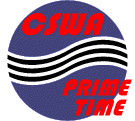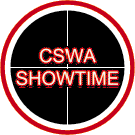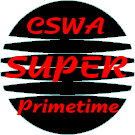|
|
|
||||||
| Table Of Contents | |||||||
| 1. What is
the CSWA? 2. How to join? 3. How does the CSWA work? 4. Cards |
|||||||
| 1. What is the CSWA? | |||||||
In 1988, Chad Merritt and Stephen Thomas created the ChampionShip Wrestling Alliance, otherwise known as the CSWA. With four wrestlers on paper and a match system based on dice, they began the game. In 1992, the league was moved to the Sports BB on the Prodigy Online Service. For six years, the CSWA stayed ahead of the competition, setting new standards in what was deemed "cutting edge." It defined Fantasy Wrestling, and on April 12, 1998, with the CSWA's Tenth Anniversary, its permanent home was staked out right here on the internet. As a home league and on Prodigy, the CSWA has had hundreds of cards, and seen thousands of wrestlers walk through it’s doors. Soon you’ll be able to see a detailed account of the league’s history since 1988. Many members feel that the CSWA’s rich history enhances their enjoyment. You’ll find that a few wrestlers have been around since the inception. The CSWA is a generated fantasy league, which means real wrestlers
are not allowed to compete. You will not be allowed to join the league with Ric Flair,
Benoit, Raven, etc. While we encourage you to 'base' your wrestler around a composite of
real wrestlers, you should avoid duplicating the characteristics, look, etc. of just one
wrestler. |
|||||||
| 2. How to Join | |||||||
As of now, the CSWA is closed to "walk-ons." With upward of a hundred join forms submitted per week for more than a year, it just got too much to handle. From this moment on, the CSWA is only accepting "referrals" as new members, or those we specifically approach. If this changes, however, the change will be recorded here. |
|||||||
| 3. How does the CSWA work? | |||||||
Roleplay and Booking As mentioned before, the CSWA is a generated fantasy league. The object is to have fun and to be creative. The CSWA is primarily a roleplay league. Roleplay will be judged on quality, and not quantity. The success of your wrestler(s) will depend on how well you perform. While success is not based on quantity of roleplay, you must be active. If it appears that your opponent is doing considerably more roleplay than you are, chances are you will not win the match. Unlike e-mail leagues and federations of that sort, all roleplay will be done on a public message board called RP Central. Roleplay for a card begins when the card is announced and challenges are being made and signed. For cards that have open challenges, a special subject will be posted. You are responsible for issuing and accepting challenges. (See "Signing Matches and Running Angles" below) The end of roleplay for each card will be announced well in advance of the deadline. During that period, you will go one on one with your opponent. Post a note of rp, read his response and send up a counter of your own. The notes will be judged, and whoever gets the best of it will likely be declared the winner. Roleplay against other competitors may also be counted. The CSWA is also a ‘booked’ league. Because the league does not live day to day, the grand scheme of things will always be taken into account. Your wrestler WILL lose matches. Accept that as fact. With two good roleplayers going at it, it becomes very difficult to decide winners. With that in mind, the front office will look at the emerging and ongoing storyline, as well as angles requested. Angles are a significant part of success as well. While most angles are used for 'push' over the course of a storyline, in some cases an angle can actually be a deciding factor in the match, along with roleplay. If you are a new wrestler, you can count on paying your dues. You must work your way up the ladder. Title shots for newcomers will not be granted. You must earn the shot. Challenge an established star in your first few matches, and chances are you’ll do the job. Paying your dues does not mean your effort isn’t noted. Like wrestling itself, jobs are a part of the business. Again, the bigger picture is what the league books towards. So, in the beginning, wins and losses don’t necessarily tell how you’re doing. The development of your character is first and foremost the prime factor. Get a feel for the league, plot a course and go for it. If you have any questions as to how you're doing, feel free to e-mail us. Whether you’re a newcomer or an old timer, if you give the effort and show improvement you will be rewarded. On another note, it doesn’t really matter what you’ve done in other leagues. This is the CSWA, "the big time." While your wrestler’s history is encouraged when you join, don’t expect it to carry too much weight. Signing Matches and Running Angles When a new card is in the works, a new forum for it will open in RP Central. There may be matches set from the start based on the continuing angles, or based on what the Front Office would like to see. If you are not already scheduled a match, feel free to challenge another wrestler, or post an open challenge in the "Challenges" thread provided. Once a match is signed, be sure to have it listed in the "Signed Matches" thread, which we use to establish the card lineup. A word about gimmick matches -- many feds allow two debuting wrestlers to enter a "Hell in the Cell" or something similar. Don't expect to have any sort of gimmick match unless the situation warrants it. When you've had several run-ins with the same wrestler and you've built up a good deal of heat, gimmicks matches may be allowed. But gimmicks from the get-go is simply not how wrestling works. While not necessary for every match, angles are encouraged as part of storylines and feuds. Have something that you’d love to see in the WWF, WCW, or ECW? Well, try them here. Angles must be realistic. We’re pretty liberal as to what we run, but if it’s not acceptable it won’t happen. Also, if your opponent sends in one as well, we’ll go with what we feel fits the storyline. Don’t be afraid to team up with other members...in fact, please do. If you want to team up with a member or work on an angle together drop them an email and plot away. It’s also a wise idea not to post angles in RP Central. In order to be considered, all angles must be sent by e-mail to the front office at "angles@thecswa.com" before the roleplay deadline ends. Important Reminder: Not all angles will be used. An angle may not play out exactly as you send it in. Remember, we're juggling angles from you, your opponent, and possibly other wrestlers who want to interfere. In a case where we have multiple angles, we try to incorporate parts of all involved. In some cases, we may retool the angle to fit into the current storyline...or to create new feuds and storylines. Front Office The CSWA's 'legit' front office is comprised primarily of five members. Co-Presidents and co-founders CS Enterprises, Chad Merritt and Stephen Thomas, Vice-Commissioner Mark Vizzachero, and Vice-Presidents Steve Radder and Gregg Gethard. All are seasoned RPers and match writers. Chad Merritt and Stephen Thomas handle and oversee the maintenance and updating of all FW.com pages, as well as keep a general handle on the league's day- to- day business. Mark Vizzachero serves as the chief cardwriter and all-around expert. Steve Radder assists with web page updates, as well as keeping track of angles and other important details. Gregg Gethard assists with card writing, as well as focusing on talent development. The front office handles card-writing, booking, managing angles, etc. Their decisions are final. If you have an issue to bring up, feel free to e-mail us. Complaints, whining, and general dissatisfaction with losing may be voiced via e-mail. However, we ask that you realize there are various reasons for losing matches. We look at the overall league when putting cards together and deciding winners. A loss today may be setting you up for a major push tomorrow. Part of playing the game is learning to lose.....if you can't do that, then you shouldn't play. If complaints and whining become excessive, you'll be warned. If it continues, you'll be asked to leave. Interviews and Storylines Interviews play a major part of the CSWA, both in roleplay, cards, etc. This section contains some basic guidelines. a) Interviews in Roleplay A large part of roleplay is interviews. Some are simply off-the-cuff comments in response to another wrestler; others are long, intensive comments regarding the why, what, when and where of a wrestler's past, current, or future actions. Interviews can be done with or without interviewers. You cannot physically attack other wrestlers in roleplay. b) Interviews on Cards All CSWA cards often feature interview segments with wrestlers. If you would like to request an interview segment for an upcoming card, simply e-mail angles@thecswa.com. We'll let you know whether a segment is appropriate for the card and available. We may also give you particular requested on points to hit on to keep the interview applicable to the card. Please realize that only so many interviews can be included on a 'balanced' card. If we ask you to hold off until the following card, please understand. Spots on the CS TRIBUNE may be available for specific interviews or 'columns.' Interviews on cards should include an interviewer. They may be done from various locations: in the ring, backstage, by-satellite, etc. These interviews should be reasonably concise and very well thought-out. c) Interviewers Various CSWA commentators serve an interview role for cards. You may feel free to use these characters as interviewers in your roleplay. Rudy Seitzer: The ultimate 'face' commentator, Rudy pulls for the good guys and berates the bad. Rudy's used to being threatened...but don't push him around too much. Rumor has it that Rudy once had a hidden identity as a masked wrestler named The Hooded Falcon. Some chalk that up to coincidence in the timing of their appearances. Stan Parsons: Stan is the only commentator member of the illustrious Parsons family. Stan doesn't mind making fun of the good guys....or the bad. He's a bit of a smart-aleck. Stan put on the tights only once...in his fill-in role as the Red Midget when the real Red was hospitalized after a savage attack. Billy Buckley: Son of CSWA play-by-play announcer Bill Buckley, oft-time commentator Billy Buckley has done play-by-play for some independent federations. He tries to ask the 'hard-hitting' questions and get to the bottom line. Billy, as many second-generationers do, continually tries to establish himself apart from his father. d) Storylines From time to time, you may see various characters step out of 'interview' format and run an ongoing storyline. This storyline may take place 'off-camera', thus it is 'unknown' to others. While not the traditional "interview" against a specific opponent, storyline roleplay is counted just as significantly.
|
|||||||
| 4. Cards | |||||||
The CSWA's goal is to keep action ongoing and exciting. While most cards are open to challenges, some events will have pre-announced matches on the card. All challenges are subject to acceptance by the CSWA front office. Please note that cards do not take place on a specific day each week. We average one-two cards every one-two weeks, sometimes more, sometimes less. The larger the card, the longer it takes. We'll keep you up-to-date in the card topic, as well as by the CSWA mailing list (available for sign-up on the TRIBUNE) when a card is being written and completed. We'll also take this time to mention the difference between 'short-form' and 'long-form' match writeups. 'Short-form' refers to matches that are written in recap form. Many undercard matches are written in this format. 'Long-form' matches feature 'blow-by-blow' commentary. Most Main Events and championship matches will be written in this format.
PPVs Pay-per-views happen approximately every eight-plus weeks.
They are special,
and therefore contain special matches. Most of the time, these cards are not open for
challenges. They are in place so that the best of the best can shine, so that the biggest
feuds can come to a head, and the biggest storylines to their conclusion. The CSWA is based
around CHARACTER... and the PPV is a prime highlight. |
|||||||




